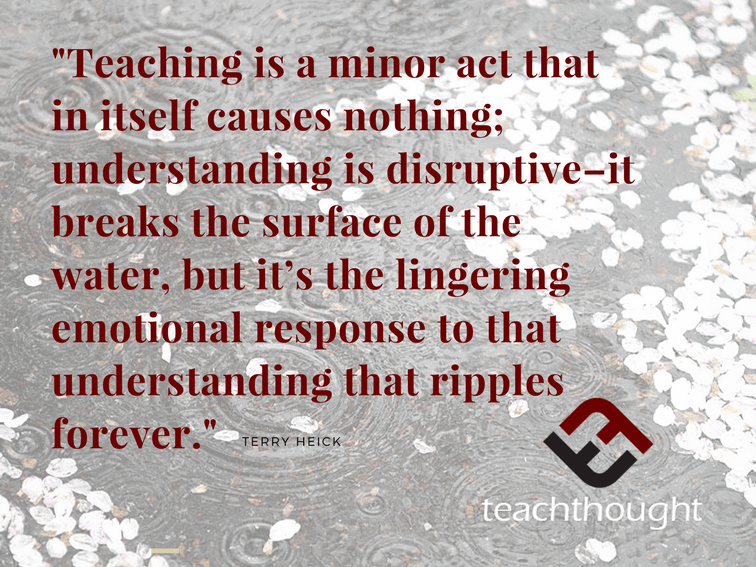
Is Emotion More important Than Understanding?
by Terry Heick
Teachers mean well.
By teachers, I mean you and I. We mean well.
After all, here we are, creating and consuming resources to improve the learning of someone, somewhere. First and foremost, we’re in education to begin with — that’s a selfless and Sisyphean pursuit in itself. We want what’s best for the future of mankind, so we decided to teach. Went to college, learned about Vygotsky and Piaget trying to find out what moves students.
That part’s simple: It’s emotion.
The Human Need To Belong
The need to belong, the desire to be understood, the instinct to understand — these are all universal human emotions that do not fade with time, vary across generations, or stop just because you’ve got algebra to teach. They lord over a student’s mind constantly, and require more than a little bit of ‘social and emotional learning’–they require emotion at the core.
But in western education–being the purveyors of both ambition and science that we are — we’ve tried a more analytical route, attempting to decode how learning happens (and the human genome as well, not ironically). We’ve found its characteristics, we look for research and data that prove we’re not wasting our time, and then we struggle mightily to get the results we want.
While every multiple choice question has a distractor — an answer to tempt the responder to choose the answer that’s nearly right–it might be that assessment itself is the distractor, because few experiences are as cognitively arresting as a rigorous academic exam.
A solution, though, is well within reach.
Replace teachers–that means you and I–with emotion.
The Neuroscience Of Emotion And Learning
Of course, there’s neuroscience jargon that explains how emotion impacts learning. A 2007 Johns Hopkins School of Medicine study explains:
Emotion enhances our ability to form vivid memories of even trivial events. Norepinephrine (NE), a neuromodulator released during emotional arousal, plays a central role in the emotional regulation of memory . . . Our results indicate that NE-driven phosphorylation of GluR1 facilitates the synaptic delivery of GluR1-containing AMPARs, lowering the threshold for LTP, thereby providing a molecular mechanism for how emotion enhances learning and memory.
So emotion enhances learning by flooding the brain with biological actuators of memory. In education, we look for symptoms of these emotions, maybe engagement or creativity.
Or the ultimate prize in K-12: proficiency.
We then look to crude mechanisms that will cause these symptoms — we group students, give them ‘voice and choice,’ ask them to ‘predict what might happen,’ and then have them turn to an elbow partner to discuss how their predictions did and did not pan out. We hang Marzano’s 9 on the wall, and go to our weekly data team meetings to try to figure out what’s going on, all the while missing the rub: None of this causes emotion and emotion doesn’t (only) cause learning anyway.
It supersedes learning.
Students Remember How You Made Them Feel
“Students may never remember what you taught them, but will never forget how you made them feel.” This age-old saying gets its point across–it gets at the conundrum facing every teacher every day as he or she begins class: while you look for your students’ attention and try to cause engagement, it’s their emotion you need to skillfully identify, navigate and masterfully manipulate.
Of course, mastery matters. A learner that understands can take that understanding with them and do something great. But it’s their emotion–their affections and hopes and concerns–that make them human and carry them when ‘being rational’ isn’t enough. Begin the learning process with emotion, use it throughout the process, and end there, too. A robot learning Chaucer is still a robot.
Emotion is more important than understanding because, well applied, emotion should drive us toward empathy and capability and possibility and humility through our collective understanding. Emotion will seek understanding but understanding will not seek emotion.
Teaching is a minor act that in itself causes nothing. Understanding is disruptive–it breaks the surface of the water and enables depth and enduring understanding. But it’s the lingering emotional response to that understanding that ripples forever.
